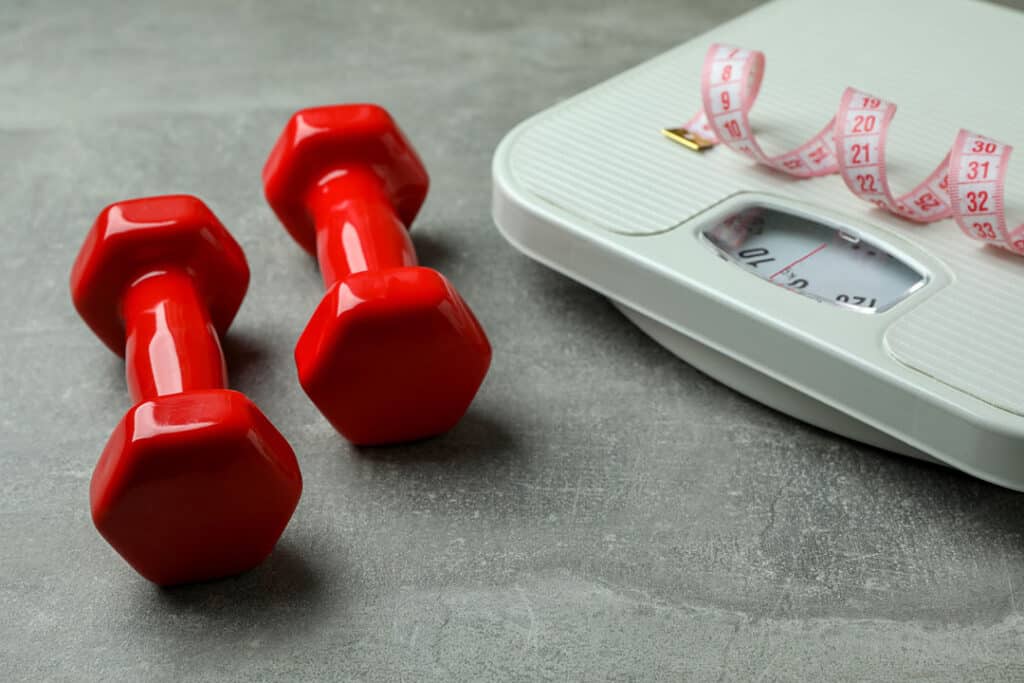Getting enough sleep and exercise are two important lifestyle habits for weight loss. Here’s why and the importance of each.
Anyone on a weight loss journey will likely agree that losing weight is not easy (despite thousands of quick fixes and miracle tips claiming otherwise).
The truth is that our bodies don’t act like simple calorie-burning machines. Other factors – like food choice, lifestyle, sleep quality, and emotions – can all wreak havoc on our fat-burning systems.
If you’ve struggled to lose weight despite dieting, it may be time to look at some other factors that could be impacting your goals: sleep and exercise.
Both movement and rest are critical to losing weight effectively. Are you leveraging them the right way?
Understanding Weight Loss

Losing weight is a goal many of us share, but it’s not as simple as just eating less. There’s a lot more going on behind the scenes that can help or hinder your progress. Let’s take a closer look at the two most basic components of weight loss:
> Calories: Your Fuel
Calories are the fuel your body needs to do everything from breathing and running to thinking or fighting off an infection. If you put in more fuel than your body needs, it stores the extra as fat to be used later on. To lose weight, you need to burn more calories than you take in – creating what’s called a calorie deficit – to tap into and burn your body’s fat reserves.
But here’s where it gets tricky: not all calories are created equal. The source of your calories matters. Whole foods like fruits, veggies, lean proteins, and whole grains are packed with nutrients that keep your body running smoothly. Processed foods, on the other hand, often contain empty calories that can lead to overeating because they don’t keep you full for long.
> Metabolism: Your Engine
Your metabolism is like your body’s engine, turning food into the energy you need to live. A faster engine burns more fuel, helping you lose weight. But metabolism isn’t a one-size-fits-all deal. It’s influenced by things like your age, sex, muscle mass, and how active you are.
For example, muscle burns more calories than fat, even when you’re at rest. That’s why strength training is so important for weight loss – building muscle can boost your metabolism, helping you burn more calories throughout the day. As you get older, your metabolism naturally slows down, which is why it can be harder to lose weight as you age. But don’t worry – staying active and eating a metabolism-boosting diet can keep your metabolic rate revved up.
What Else Affects Weight Loss?
While the textbook basics of weight loss come down to eating fewer calories than your body burns in a day, losing weight in real life is a bit more complex than that. Everything from sleep, stress, and even your genes plays a part. So what else could be sabotaging your weight loss goals?
1) Stress Levels
When you’re stressed, your body releases cortisol, a hormone that can increase your appetite and lead to cravings for high-calorie, sugary foods. Chronic stress can make it harder to lose weight and even cause you to gain weight, especially around your belly.
2) Genetics
Some people are genetically predisposed to carry more weight or store fat more easily. While you can’t change your genes, understanding your body type can help you set more realistic goals and find a weight loss strategy that works for your body’s blueprint.
3) Activity & Lifestyle
How you live each day is almost as important as what you eat when it comes to weight loss. A lot of this comes down to your balance of activity and rest. Someone who lives a relatively active lifestyle will have an easier time losing weight than someone who spends most of the day doing sedentary activities. Along with increasing your exercise, there are many other ways to easily boost your daily activity, like taking the stairs, parking at the back of the parking lot, doing chair exercises, or going for a light walk after meals (which has been shown to reduce blood sugar).
4) Sleep Quality
Good quality sleep is one of the most powerful gifts you can give your body – especially if you are working towards a healthier weight. Not getting enough sleep will eventually throw off the hormones that manage your appetite and satiety levels. You’ll also need plenty of sleep to restore your energy and repair your muscles if you’re working out more to lose weight.
The Role of Exercise in Weight Loss

Along with eating a healthy diet, exercising is the main recommendation anyone looking to lose weight will hear. And for good reason – exercise helps burn more calories and fat, builds metabolism-boosting muscle, and improves your overall health.
On the surface, regular physical activity promotes weight loss because it increases the number of calories your body uses for energy, creating that calorie deficit you need to shed pounds.
So, which type of exercise is best for weight loss?
Cardiovascular exercises like running, HIIT, cycling, and swimming are particularly good for burning calories quickly. Strength training, on the other hand, builds muscle mass, which can increase your resting metabolic rate, helping you burn more calories even when at rest. Using both will help you reach your weight loss and fitness goals faster.
Beyond improving your BMI, exercise offers tons of other health benefits. It improves heart health, increases your energy levels, and makes you feel happier. Not to mention, it can also help improve your sleep quality, which in turn supports weight loss and optimal health.
Just be sure to exercise in moderation, according to your fitness level and body type. Overdoing it can lead to burnout or injury, which will only hinder your weight loss (and crush your motivation).
The Role of Sleep in Weight Loss

We often think of sleep as the secret to better energy, focus, and mood. But did you know that it’s also a massively underestimated factor in weight loss?
Quality sleep is essential for regulating the hormones that control things like appetite, cravings, and satiety levels. Insufficient sleep increases ghrelin levels and decreases leptin levels, making you feel hungrier and less satisfied after meals. This hormonal imbalance can lead to overeating and craving unhealthy foods (and therefore weight gain).
Beyond that, sleep deprivation can also lead to insulin resistance. With this condition, it’s harder for your body to process glucose efficiently, which can lead to weight gain and increase the risk of type 2 diabetes.
Quality sleep also supports your mental health. While stress, depression, and anxiety can lead to irregular eating habits and cravings, balanced moods promote intuitive eating, healthier choices, and improved motivation – a recipe for weight loss success!
How much sleep is best for weight loss?
Adults typically need 7-9 hours of sleep per night. While this may seem impossible with an overflowing schedule, late-night stress, or other issues that sabotage sleep, don’t worry. Improving your sleep cycles can be done with the right habits. Explore more tips for establishing a consistent sleep schedule here.
Comparing Sleep and Exercise for Weight Loss

Exercise and quality sleep are both critical for losing weight effectively. But does one reign supreme?
Sleep vs. Exercise: Short and Long-Term Effects
In the short term, exercise often shows more immediate results in weight loss because it burns calories directly. You might notice your clothes fitting better or see a change on the scale after a few weeks of consistent workouts.
However, the long-term benefits of adequate sleep are just as crucial. Without quality sleep, you likely won’t be able to maintain the benefits of the exercise you’re working so hard at. Sleep is needed to repair and build muscle, reset metabolism, and restore your energy for tomorrow’s gym session.
Consistent, quality sleep also helps maintain hormonal balance, reducing the risk of weight gain over time. Sleep regulates those hunger hormones that control hunger and satiety, cortisol, and fat storage. Therefore, while exercise kick starts weight loss and keeps you burning fat, sleep ensures long-term success is sustainable.
How Age and Health Affect the Importance of Each
As we age, our metabolic rate slows down naturally. This makes both exercise and sleep essential for maintaining a healthy weight as we age.
For older adults, a combination of moderate exercise and quality sleep can help maintain a healthy weight and overall well-being. Exercise helps preserve muscle mass, which boosts metabolic rate, while sleep supports recovery and hormonal balance.
But For those with health conditions, focusing on sleep might be even more crucial. Poor sleep can exacerbate health issues like insulin resistance and inflammation, making weight loss more challenging. Therefore, tailoring your approach based on age and health can help you optimize your results.
Sleep & Exercise: Perfect Weight Loss Companions
Sleep and exercise both provide key elements to the weight loss process – they complement and strengthen the other’s benefits.
Regular exercise improves sleep quality by reducing stress and anxiety, promoting deeper, more restful sleep. On the flip side, adequate sleep enhances exercise performance and recovery, giving you the energy and motivation needed to maintain an active lifestyle.
A balanced weight loss approach that supports both elements will not only help you reach your goal weight faster, but help you sustain your healthy weight and improve your overall health.
How to Use Better Sleep & Exercise to Lose Weight Faster

Losing weight may not feel like a piece of cake, but it can be easier when you know how to leverage sleep quality and exercise to make the most of your efforts.
By combining the power of quality sleep with regular exercise, you’re likely to see faster, more sustainable results and feel better along your weight loss journey, too.
1) Create a balanced sleep routine.
A consistent, quality sleep routine is just as important as a workout regimen. Get into the groove of a regular sleep schedule by going to bed and waking up at the same time every day, even on weekends. Create a relaxing pre-sleep routine, such as reading or taking a warm bath, to signal to your body that it’s time to wind down. Avoid vigorous exercise, heavy meals close to bedtime, and blue light exposure as these can disrupt your sleep.
2) Create a balanced exercise routine.
When you’re planning your workout routine, be sure to keep it balanced with both cardiovascular and strength training exercises. While cardio helps you reach that calorie deficit faster, strength exercises build muscle that will burn more calories for you – even while you sleep!
How can you balance these two styles? Try to exercise at least 150 minutes of moderate aerobic activity, such as brisk walking or cycling, spread throughout the week. Then, incorporate muscle-strengthening activities, like weight lifting or bodyweight exercises, at least two days a week.
3) Avoid late-night workouts.
While any exercise encourages weight loss, the timing of your workouts matters. This is mostly because working out too late can negatively impact your sleep quality. Late-night workouts can leave you feeling too energized to fall asleep easily, disrupting your sleep schedule and reducing the restorative benefits of sleep. So, aim to complete your workouts at least 3-4 hours before bedtime. If you prefer evening exercise, opt for low-intensity activities like yoga or stretching, which can help relax your body and prepare you for a good night’s sleep.
4) Stay hydrated.
What’s another thing sleep, exercise, and weight loss have in common? The need for proper hydration for optimal benefits.
Drinking enough water throughout the day keeps your muscles and joints lubricated, boosts your energy levels, and aids in recovery after workouts. This also physical performance, preventing fatigue and helping you exercise more effectively. In the gut, healthy hydration aids in digestion and can reduce overeating by helping you feel full. Additionally, staying hydrated promotes better sleep by preventing nighttime awakenings caused by thirst.
Drink plenty of water (usually 8-10 glasses) during the day, and try to reach this goal at least a few hours before bedtime to avoid interrupting your sleep with bathroom breaks.
5) Manage stress like a pro.
Stress is a natural part of life, but how we manage it can make a huge difference in whether or not it impacts our sleep, lifestyle, and ultimately our weight. High stress levels can disrupt your sleep by increasing cortisol, a hormone that makes it harder to relax and fall asleep. Poor sleep, in turn, affects your energy levels and motivation to exercise.
By practicing relaxation techniques such as deep breathing, meditation, or yoga, you can reduce stress and promote better sleep quality. Lower stress levels means better focus and endurance during workouts, more productive sleep, and healthy weight loss.
Move, Sleep, and Eat Your Way to a Healthier Weight with AlignLife

Losing weight (and keeping it off) is so much more than a health goal – it’s a lifestyle that paves the way for your best health. It may not be easy, but it can be simple when you look beyond calorie-counting and address the many factors (like sleep, stress, and activity levels) that contribute to unwanted weight gain.
Are you struggling to make progress on your own? If so, you’re not alone – losing weight is no small endeavor, and issues like poor sleep, pain and limited mobility, and one-size-fits-all diets only complicate the journey.
At AlignLife Centers, our team of chiropractors, functional nutritionists, and weight loss specialists make reaching your weight loss goals simple and achievable. We take a holistic approach that not only looks at calories, but the whole picture of your health to help you lose weight more effectively.
From identifying sleep issues and improving your sleep hygiene to recommending the right exercises and meal plans for your body and goals, you’ll receive a personalized plan that supports your overall well-being and maximizes your weight loss efforts.
Don’t wait to get in your best shape. Reach out to your nearest AlignLife Center to get started with a weight loss plan that works for you!



